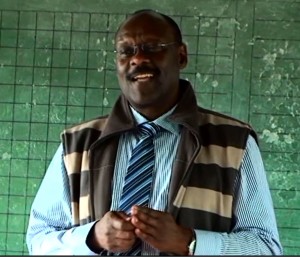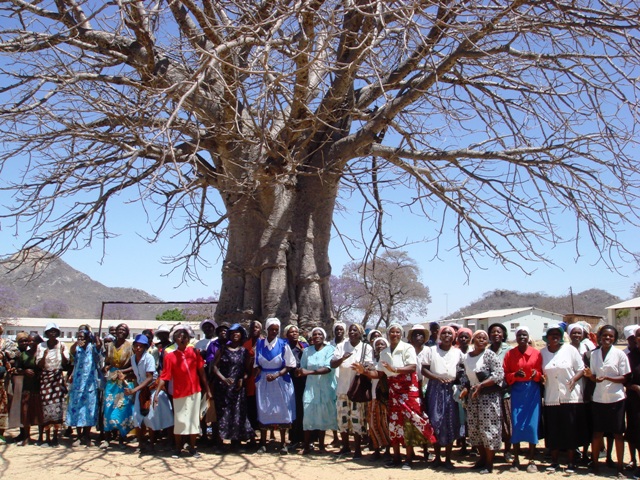
Minister Visit to Chigure CHC
April 2014
Dr. David Parirenyatwa, the Minister for Health and Child Welfare in Zimbabwe comments on a visit to a Community Health Club in Chipinge District. He came to see for himself the claims of Mr Goldberg Mangwadu, the Director of Environmental Health Services who believes that Manicaland is ahead in prevention of common diseases due to the CHC Approach. This is a direct transcript of his speech:
‘This community is privileged to be the first district outside of Mutare to be visited by the new Provincial Medical Doctor for Manicaland, Dr Mafaune. I would also like to acknowledge the presence of the Country Director of Zimbabwe A.H.E.A.D (Applied Health Education and Development), Mr. Matimati. I have heard you speak and you are quite an orator! I understand that you have a nursing background and have been involved in many fields. Your foundation was within the Ministry of Health from where you spread you wings and you have become an asset to the nation.
I would also like to acknowledge the presence of Mr Mangwadu the Director of Environmental Health Services; Mrs Gerede, a heavy-weight nurse in Zimbabwe – not in terms of weight, but because of her position as the senior most nurse in Zimbabwe Government; the District Administrator Dr Seenza. We also have Dr Kuvengwa, the District Medical Doctor who has been with the District of Chipinge since 2012. As you have noticed women are occupying the most senior positions in this District, showing that they are being empowered. Even within the Chigure Community Health Club, it is self evident that women dominate with only 6 male members in the club and 66 female. However for gender balance, there should be more male participation within health clubs.
What brought me here, as the Minister of Health and Child Welfare, is the preventative aspect of health. We tend to concentrate on hospitals, like Parirenyatwa, Mpilo, Mutare District or Provincial hospitals – that is where our efforts as Government have been. People have go to hospitals when they are already ill. Our idea here now, is to prevent diseases before they reach the people. What is referred to as preventative medicine.
That is our objective today. The Director of Environmental Health Mr. Mangwadu has been pestering me every Monday morning at our meetings. He bragged that Manicaland was already miles ahead of the other provinces in terms of preventative medicine because they have a high coverage of Community Health Clubs (CHCs). I did not believe him and expressed my doubts to him verbally. We finally agreed that we should visit the area together to see for ourselves.
Today we are here and as they say the proof of the pudding is in the eating. We need to feel it with our own nose, like smelling snuff. We need to see if there is something different happening in the (Manicaland) communities. Now I have seen it and I say we should not continue to emphasize the curative aspect of medicine – it’s time we focused on the community (like you are doing here) to see what they can contribute in terms of prevention.
Hospitals are treating diseases that are preventable. Mr. Matimati says that at the CHC people are taught that when they cough or blow their nose they are supposed to wash their hands. If you shake someone’s hand without washing your hands after you sneeze, you are passing on the ‘gift’ of the disease. Simple things like spitting any and everywhere can be stopped.
You have been blowing your trumpet about the rate of toilet construction here. We know that in Zimbabwe, Blair (VIP) toilet construction had reached 55% – that is 55 out of every 100 households would have a Blair toilet. Then (in 2000) our economy took a tumble and right now (2015) we are at 32% sanitation coverage. Here in Manicaland you are within that range, but in less developed areas like (UMP) Uzumba Maramba and Pfungwe sanitation is around 27%. As Government, we want to get back and exceed 55%. We must aim to get to 90% of toilet coverage in the country.
Village Heads and the District Administrator, let us ensure that when a person is constructing his/her homestead, they realize the importance of a constructing a toilet as well. I cannot do a snap survey of this area to count how many homesteads have toilets, but I would want you to ponder on this point after my departure.
If you have constructed nice Blair toilet, like the one I visited earlier then encourage the trend and it will catch on like wild fire in the area. You have just told me that this health club built 18 Blair toilets without any assistance over and above the initial 39 subsidized latrines. This is true development – the kind that we want to see.
If we look at Bilharzia this should be researched in schools to see how many children are being affected by the disease. We should also look at skin diseases and tuberculosis. When you cough for over 3 weeks and your cough is not improving, if you are sweating at night and if you are losing weight, then maybe you are suffering from TB. Go seek treatment quickly as TB is curable. This is what we want people to know. If a child is eating healthy food and he/she is not gaining weight or growing then maybe that child has worms in their stomach. Things like that help us in ensuring the health of our children. We acknowledge the importance of Community Health Clubs like Chigure.
But Mr Matimati, Mrs Radio 2 and Mr Mangwadu – is what you have done here is replicable in other areas? We want to see if we can incorporate this model into our policies on heath and copy this everywhere in the country so that it helps us. We want to verify the replicability of the strategy then implement it nationwide.
Other countries are copying us. This idea was born from a doctor originally from Zimbabwe – a white Doctor (Dr. Juliet Waterkeyn. CEO Africa AHEAD). Rwanda quickly copied it and implemented it nationwide. It is now a law in Rwanda that all communities must have a health club.
We want the idea (of the CHC) to be further refined so that it is stronger here. I came because I doubted what Mr. Mangwadu was always telling me about the CHCs. I thought he just said these things to make our Monday morning meetings more interesting. I am happy I came here to verify for myself.
Zim AHEAD Director, Mr. Mangwadu and Mrs. Radio 2, please come up with a Roadmap showing how the CHC programme this can be replicated in other districts. The Ministry would then hold workshops to discuss and try and replicate the Community Health Club approach.
Let us start within our homes so that we have high standards of hygiene then hospitals will not bear the burden of treating preventable diseases. In this way we ensure that we have healthy men, women and children.’

